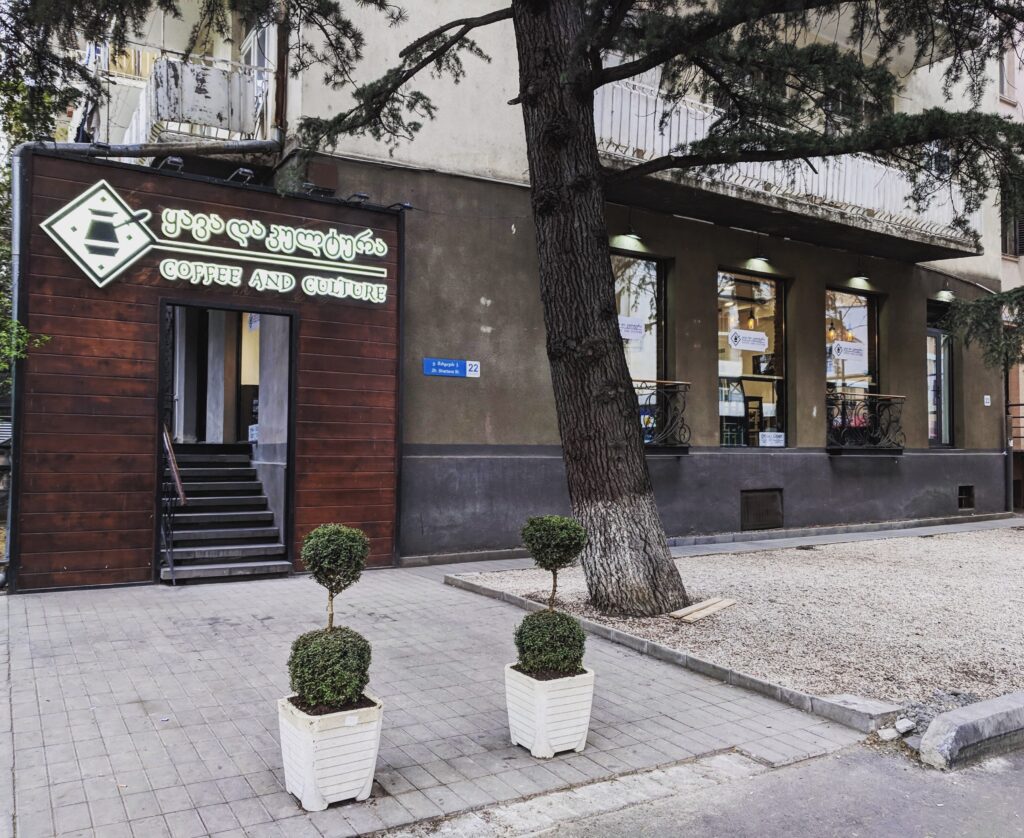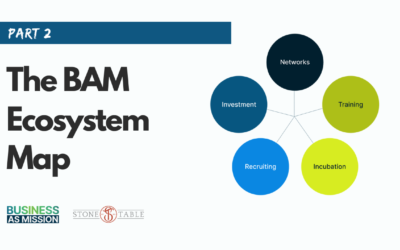Stand Outs: Creating Counter-Cultural Companies with Biblical Values

“There’s something different about this business,” the elderly woman who lived above our shop said.
She made a hobby of calling the police on us. Three times she reported us before we even opened the doors to our coffee shop, her imagination running wild with fears of drunk men throwing bottles or loud music shaking the walls. She even convinced herself we were going to destroy the building, like some villain from an old Soviet nightmare.
Okay, that last one might have been true. Who knew that foot-and-a-half thick piece of concrete in the middle was so essential to the building? She had stumbled upon a moment of justice this time, but did it really justify all the clogging of pipes to flood the shop, spitting on our baristas, and regular storming of the shop with a team of fellow residents?

We’d been running the shop for a few months in Tbilisi, Georgia (the country, not the state). It was a cool summer evening when we finally finished decorating our specialty coffee haven. The walls were lined with faces of people from around the world, a bookshelf of dusty old Russian novels, and a kilim rug that hung above low, Turkish-style seating.
We’d hardly found our niche, balancing the interests of the locals and Persian immigrants who could barely afford a cup of tea and the Russian moguls and Indian medical students whose standards I supposed may be impossible to live up to.
I was across town, picking up a few last touches for the shop when the phone rang. It was Dachi, one of our baristas.
“Sorry Jon,” he started slowly, “we weren’t sure if we should bother you, but the shop is on fire.”
I froze. “Wait, what?!”
He stuttered over the details. Or maybe he was perfectly clear, only my brain was now muddling it all up. Either way, the electrical panel sparked, everyone was outside, and the fire department was asking for my signature.
“My signature?” I thought, questioningly. Clearly I was unprepared for a fire in a country where I could barely understand any of the language and where, most often, I was lucky just to appease the neighbor on the third floor that we were NOT, for the 15th time, going to open a karaoke bar.
The fire. The neighbors. The chaos. By the time I arrived, our resident antagonist was back, yelling at the fire department, demanding they clean her apartment (because apparently, we were responsible for that too).
To my surprise, two of our team members jumped up.
“We’ll clean it,” they said.
“God help them,” I thought, but I really wish I had prayed those words.
Her home was a shrine to Stalin, an icon of the old guard. She hated everything we stood for, and to most of the team, it seemed like she hated her own country too.
But something changed after that day. The dust settled. We made our repairs. And in just a few short weeks along came our neighbor, her voice a new, soft, friendly tone.
“There’s something different about this place,” she remarked.
“Tell her it’s Jesus,” I said, turning to one of the baristas who spoke much better Georgian than I did.
They did. And our third-floor neighbor—the woman who had made it her mission to sabotage us—was smiling. She even told the staff, “Angels are watching over your business.”
And, suffice to say, things were never the same between us.
There was something different about the way we were living and who was living in us stood out to her.
Stand Out – The Right Way
So what exactly was different about us? Of course, Jesus is the answer! But if we’re honest, not every Christian business reflects Christ.
We’ve all had the opposite experience.
I recently walked into a body shop to get my car repaired. The prayer wall by the front desk was a pleasant surprise. Several bibles and Christian books by the manager’s desk further encouraged me as I walked in.
I was hopeful. But after the manager suggested we sneak a repair into the insurance claim, something felt off. He even said, “Whether that’s honest is between you and God.”
Different? Absolutely. But not in the way I wanted.
What set our coffee shop apart wasn’t a Bible on the counter or a cross on the wall. We had a set of intentional, biblical values that caused us to stand out.
A friend of mine, Tom, calls this approach “Stand Outs.” (View the full framework here.) He coaches missional businesses to adopt counter-cultural values based on the Bible—values that make them different, not because they’re just Christian, but because they reflect something more powerful.
He has this to say:
Most people haven’t defined their values. It’s a major exercise for businesses. Experts are brought in. Post-it notes are put on walls. Words or terms are voted on. Discussions are had regarding how a word or phrase will be further defined. For a really good “business values” exercise, each value is broken down and defined for how it can be lived out in that company by every employee. Have you been through an exercise like this before? By the end of it, many people are either exhausted or charged about implementing and using these newly defined and agreed-upon values.
The problem is that most businesses don’t even realize their values are shaped by the culture around them. If the cultural norm is cutting corners, they cut corners. If the expectation is mediocrity, that’s what they deliver. But Paul tells us in Romans 12:2,
“Do not conform to the pattern of this world, but be transformed by the renewing of your mind.”
To stand out, we have to choose something different.
Counter-Cultural by Design
Jo Plummer, co-chair of BAM Global, calls this counter-cultural values designing one of the 6 Ways BAM Practitioners Build Their Company Culture.
The truth is every business has a culture. It’s either accidental or intentional. If it’s accidental, you might end up with a Bible on your shelf and an attitude that reflects anything but Christ. But if it’s intentional, like it was for us, this consistent company culture begins to be noticed by others.
In our coffee shop, we prioritized things like the Golden Rule (love your neighbor as yourself), joy, and prayer. That meant clean sidewalks, smiling baristas, and a team that handled an electrical fire with surprising peace. These weren’t just nice ideas—they were the product of intentional decisions to shape our business culture around biblical values.
Michael Frost, author of Surprise the World, talks about living “questionable lives”—lives that make people wonder what’s different about us. When we refuse to conform to the patterns of this world, we create businesses that make people stop and ask questions.
How to Build a Counter-Cultural Business
So, how do you build a business that stands out?
Step 1: Identify the negative norms around you.
In Georgia, the post-Soviet mindset was one of mistrust and self-interest. Customer service was often a joke. A clerk once told a friend of mine they weren’t stocking his favorite chips anymore because they “sold too many of them.”
Yes, you heard that right.
It didn’t take us long to identify “bad customer service” as a negative cultural norm.
Step 2: Flip it.
What does the Bible say that challenges that cultural norm? In our case, the Bible calls us to love our neighbors and serve one another with humility.
So the Golden Rule was a counter-cultural biblical value we chose to live by.
Step 3: Write out your values and commit to them.
Make your culture statements clear, intentional and hold yourself to them.
We’re called to stand out, to live lives that are questionable in the best possible way, and when we infuse our businesses with biblical values, people will notice. They might even say, “There’s something different about this place.”
And that difference? It just might lead them to Jesus.
If you’d like to know more about “Stand Outs” or connect with Tom directly, please reach out to me at jon@thestonetable.org.
Tom is an incredible BAM coach and is invaluable to many missional businesses in hard to reach and creative access nations. Thank you, Tim, for allowing us to share this framework with others. Your work is making a difference!


